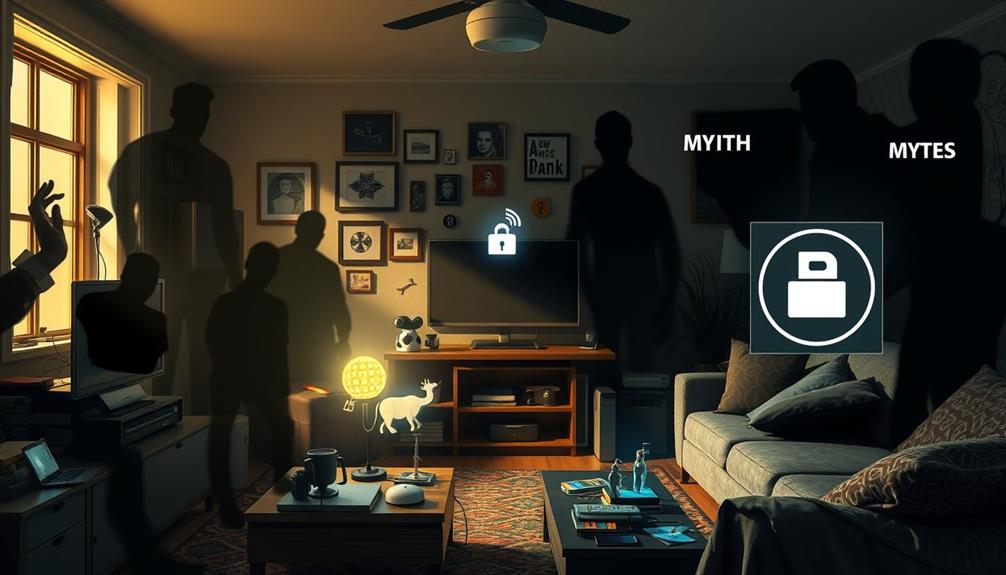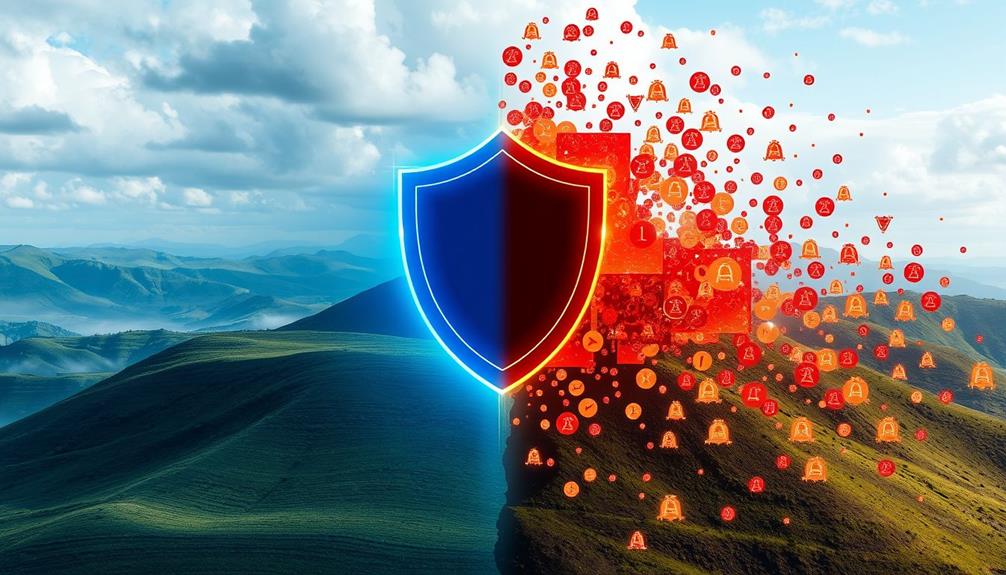You've probably heard several tech myths that mislead you about modern devices. For instance, charging your phone overnight won't ruin its battery, thanks to advanced management systems. Incognito mode doesn't guarantee complete privacy; your activity can still be tracked. Macs aren't immune to malware, so regular updates and antivirus software are critical. Additionally, higher megapixels don't always mean better image quality; sensor size matters more. Public Wi-Fi is risky without a VPN, and smart devices can collect data without you realizing. Understanding these myths can protect your tech use, and there's more you'll want to know about this topic.
Key Takeaways
- Modern battery management systems prevent overcharging; lithium-ion batteries benefit from partial discharges and frequent charging without memory effects.
- Incognito mode does not ensure complete online privacy; ISPs and websites can still track user activity and IP addresses.
- Macs are not immune to malware; regular updates and antivirus software are essential for maintaining security against rising threats.
- Public Wi-Fi poses security risks; using a VPN encrypts data and protects sensitive information from cybercriminals on unsecured networks.
- Antivirus software cannot guarantee total protection; user actions significantly contribute to malware infections, emphasizing the need for individual vigilance.
Battery Charging Myths
While many people worry about how to charge their smartphones properly, the truth is that modern devices come equipped with advanced battery management systems that prevent overcharging. You can safely leave your device plugged in overnight without fearing damage to the lithium-ion battery.
In fact, these batteries are designed to handle full charges efficiently. Most battery wear occurs over time due to charging cycles rather than your overnight habits. Additionally, understanding the importance of credit card management can help you make informed financial decisions that support your tech purchases.
One of the biggest myths is that batteries develop "memory" effects, meaning you need to fully discharge them before recharging. This idea is outdated; lithium-ion batteries actually benefit from partial discharges and frequent charging. So don't hesitate to charge your phone throughout the day!
Fast charging technologies are another area filled with misconceptions. These systems charge your battery much quicker while effectively managing heat and maintaining battery health, so you don't have to worry about accelerated degradation.
Lastly, keep your smartphone's software updated. Manufacturers continually improve battery management systems through these updates, optimizing battery performance and prolonging lifespan.
Incognito Mode Misconceptions

Many people often assume that using incognito mode in their browser guarantees complete privacy online, but that's a common misconception. While incognito mode prevents your browser from saving browsing history, cookies, and temporary files, it doesn't guarantee complete anonymity.
Your Internet Service Provider (ISP) can still track your IP address and monitor your online activity, as incognito mode doesn't encrypt your data or hide it from them. Additionally, the use of AI in Cybersecurity highlights how advanced technologies are employed to enhance online safety, but they can't fully protect users in incognito mode.
Furthermore, websites you visit can collect data, including your IP address, even when you're in incognito mode. This undermines the perceived privacy benefits many users expect. Unique browser fingerprints can also identify you, meaning that incognito mode won't erase all traces of your online activity.
For those seeking enhanced privacy, consider using a virtual private network (VPN) alongside incognito mode. A VPN provides an additional layer of security by encrypting your internet traffic, making it much harder for ISPs and websites to track your activity.
Mac Security Myths

Incognito mode misconceptions aren't the only tech myths that can put your online safety at risk. Many people believe that Macs are immune to viruses, but that's far from the truth. As Macs have grown in popularity, so has the targeting of malware specifically designed for macOS. In fact, in 2022, 6.2% of malware infections occurred on Macs, highlighting the need for vigilance.
Just like understanding safe foods is vital for canine health, knowing about dog health essentials is important for your overall security habits.
Regular operating system updates are vital for patching security vulnerabilities and protecting against emerging threats. Skipping these updates can leave your Mac open to attacks. Additionally, relying solely on the myth of safety can lead to complacency, making the case for reliable antivirus software essential for every Mac user.
Furthermore, adopting cautious browsing practices is a must. Avoid suspicious downloads and always use strong, unique passwords. These habits enhance your Mac security and help prevent potential malware infections.
Don't let misconceptions lull you into a false sense of security; stay informed and proactive to keep your Mac safe.
Megapixel Misunderstandings

Megapixels often steal the spotlight in discussions about camera quality, but they're not the whole story. While a higher megapixel count sounds impressive, it doesn't guarantee better image quality. Factors like sensor size, lens quality, and the camera's overall processing capabilities heavily influence performance.
Additionally, understanding how personality tests assess individual traits can offer insights into preferences related to technology use, such as photography styles and equipment choices assess individual traits and behaviors.
Today's smartphones often utilize computational photography techniques that can greatly enhance image quality, especially in low-light conditions and complex scenes. Even if your device boasts a high megapixel count, it mightn't outperform a camera with fewer megapixels but superior processing and lens quality.
Moreover, consider pixel size: larger pixels capture more light, improving image quality in challenging lighting situations, regardless of how many megapixels the camera claims. High megapixel images can result in larger file sizes, which might create storage headaches and longer processing times without enhancing your viewing experience.
Professional photographers typically prioritize dynamic range and color accuracy over sheer megapixel counts when selecting gear for significant events.
Public Wi-Fi Risks

When you're using public Wi-Fi, it's vital to understand the potential risks involved. Engaging with unsecured networks can expose you to various threats, including data breaches and identity theft, making it essential to stay informed about digital marketing strategies to protect your online presence.
Employing a VPN can help secure your connection and protect your data from prying eyes. By taking simple precautions, like avoiding sensitive transactions, you can enjoy the convenience of public networks while minimizing threats.
Public Wi-Fi Security Measures
How safe do you feel using public Wi-Fi? While convenient, public networks can pose serious security risks. Cybercriminals often lurk, waiting to intercept your internet traffic and access your sensitive information. To safeguard yourself, consider these essential security measures:
| Security Measure | Description | Importance |
|---|---|---|
| Use a Virtual Private Network (VPN) | Encrypts your internet traffic, making it tougher for hackers to steal data. | Protects sensitive transactions. |
| Avoid Sensitive Transactions | Refrain from online banking or shopping on public Wi-Fi. | Minimizes risk of data theft. |
| Check for HTTPS | Verify that the websites you visit use HTTPS. | Enhances network security. |
Regular software updates are also vital; they patch vulnerabilities that cybercriminals might exploit. Familiarizing yourself with network security protocols can further boost your safety. By implementing these measures, you'll reduce the chances of falling victim to data theft while enjoying the convenience of public Wi-Fi. Remember, staying informed is your best defense against potential threats.
VPN Benefits on Networks
A VPN can be your best ally when using public Wi-Fi, greatly enhancing your online security. When you connect to these networks, your internet traffic is vulnerable to hackers who can intercept sensitive information like passwords and credit card numbers. By using a VPN, you encrypt your data, making it much harder for cybercriminals to execute a cyberattack or commit data theft.
This is especially important considering the importance of background checks before job offers, as protecting your personal information online is vital not just for employment but for overall safety.
Many public Wi-Fi networks lack adequate security, increasing the risk of man-in-the-middle attacks. A VPN provides an additional layer of protection against such threats. In fact, a study by NordVPN revealed that 25% of public Wi-Fi users experienced some form of cyberattack or data theft, underscoring the significance of using a VPN in these environments.
Moreover, VPNs can mask your IP address, preventing websites and potential attackers from tracking your online activities and location while you're connected to public networks. They also help safeguard against rogue hotspots—deceptive networks set up by cybercriminals to capture your data.
Smart Device Privacy Concerns

You might think your smart devices are constantly listening to your conversations, but they only activate when prompted.
In fact, many electronics have specific return policies that emphasize user rights and protections, such as Target Electronics Return Policy, which outlines the significance of original receipts for refunds.
Understanding how these devices collect data and the significance of user consent is essential for protecting your privacy.
Let's explore these concerns and clear up any misconceptions.
Activation Listening Misunderstanding
While many people worry that their smart devices are eavesdropping on every conversation, the truth is far less concerning. Smart devices primarily listen for activation cues like "Hey Siri" or "OK Google." They don't continuously record your conversations, which is a common misconception.
To enhance your overall safety and comfort at home, contemplate implementing technology for emergency alerts and communication, as highlighted in Aging With Dignity – In-Home Care Tips.
Here are some key points to reflect on:
- Privacy Settings: You can adjust settings to limit data collection.
- User Consent: Smart devices must inform you about how your data is used.
- Transparency: Reading privacy policies is vital for understanding data practices.
Awareness of these factors can empower you to control what information is shared. By taking advantage of privacy settings, you gain more control over your data security.
User consent is typically required for any data usage, meaning smart devices must be transparent about their data collection practices. Misunderstandings often stem from not reading the privacy policies, which can lead to unnecessary worry.
Informed usage is essential; when you know how your smart devices function, you can navigate privacy concerns more confidently.
Data Collection Transparency Issues
Recent studies reveal that over 80% of smart device users are unaware of the extent of data collection happening behind the scenes. Many smart devices continuously gather data, often requiring your consent for usage. However, privacy settings can limit this data collection, which is vital for safeguarding your personal information.
The lack of transparency in privacy policies means you mightn't realize how much data is shared with third parties. Furthermore, just as pet owners must stay informed about their cats' health and safety, being aware of your digital environment is essential for maintaining your privacy. Cat health and safety is an important aspect that parallels the need for vigilance in your smart device usage.
Be cautious about the permissions you grant to smart devices. Many apps request access to unnecessary data, which increases privacy risks. For example, device manufacturers often use unique browser fingerprints to track users, even when you're in private browsing modes. This complicates your ability to maintain privacy.
To help mitigate risks, regularly review and adjust your privacy settings. This empowers you to take control of your data and reduce unwanted tracking. By being proactive, you can better protect your personal information and guarantee you're informed about the data collection practices of the smart devices you use.
Transparency issues surrounding data collection shouldn't leave you in the dark—stay informed and take charge of your privacy.
User Consent Necessity
User consent plays an essential role in the privacy landscape of smart devices. When you set up your device, you'll typically see privacy policies that outline how your personal data is collected and processed.
It's important to be aware that just as essential oils can support overall wellness, your data security can also be enhanced through informed choices regarding your consent. Here are some key points to remember:
- Smart devices listen for activation keywords, but they won't record your conversations without your consent.
- You can manage privacy settings to limit data collection and enhance your security.
- Even with consent, unique browser fingerprints can track your activity online.
Understanding user consent necessity is significant. It's not just about agreeing to terms; it's about knowing what data is shared and with whom.
Privacy policies detail how your data might be used or shared with third parties. Always take the time to read these documents. They help you make informed decisions about your personal data.
Antivirus Effectiveness Limitations

Antivirus software can seem like a digital shield against cyber threats, but it's important to understand its limitations. No antivirus program can guarantee 100% protection, as cybercriminals constantly develop new malware variants. You, as the user, remain the first line of defense against these threats. Practicing safe browsing habits and being aware of phishing tactics are essential security measures you should adopt.
Regular software updates are critical for maintaining the effectiveness of your antivirus. These updates often include patches for newly discovered vulnerabilities and malware signatures. Without them, your protection could be compromised. A report from 2022 highlighted that 60% of malware infections occurred due to user actions, emphasizing your role in cybersecurity.
To enhance your protection, consider a multi-layered security approach that combines antivirus software with firewalls, anti-malware tools, and robust user education. This strategy provides better overall security against various threats.
Ultimately, individual vigilance is key; staying informed and taking proactive measures can greatly reduce the risk of cyber threats. Remember, while antivirus software is a valuable tool, it's just one part of an all-encompassing security strategy.
Conclusion
In a world buzzing with tech, it's easy to get lost in the myths that surround us, much like Alice in her wonderland of curiosities. By shining a light on these misconceptions, you're better equipped to navigate the digital landscape with confidence. Remember, not everything is as it seems; your devices may not be the guardians you think they are. So, stay informed, keep questioning, and embrace the truth behind the tech you rely on every day.









